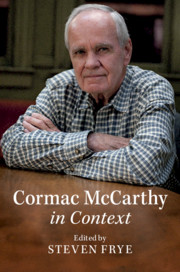Book contents
- Cormac McCarthy in Context
- Cormac McCarthy in Context
- Copyright page
- Contents
- Contributors
- Acknowledgments
- Chronology
- Part I Environments
- Part II Literary Contexts: Sources, Influences, Allusions
- Part III Intellectual Contexts
- Part IV Social and Cultural Contexts
- Part V Archives, Critical History, Translation
- Chapter 25 The Archives and the Tennessee Years, I: The Orchard Keeper and Outer Dark
- Chapter 26 The Archives and the Tennessee Years, II: Child of God, The Gardener’s Son, and Suttree
- Chapter 27 The San Marcos Archives: Blood Meridian and the West
- Chapter 28 Letters and Correspondence
- Chapter 29 Cormac McCarthy: A Critical History
- Chapter 30 Translation and International Reception I
- Chapter 31 Translation and International Reception II
- Works Cited
- Index
Chapter 27 - The San Marcos Archives: Blood Meridian and the West
from Part V - Archives, Critical History, Translation
Published online by Cambridge University Press: 12 December 2019
- Cormac McCarthy in Context
- Cormac McCarthy in Context
- Copyright page
- Contents
- Contributors
- Acknowledgments
- Chronology
- Part I Environments
- Part II Literary Contexts: Sources, Influences, Allusions
- Part III Intellectual Contexts
- Part IV Social and Cultural Contexts
- Part V Archives, Critical History, Translation
- Chapter 25 The Archives and the Tennessee Years, I: The Orchard Keeper and Outer Dark
- Chapter 26 The Archives and the Tennessee Years, II: Child of God, The Gardener’s Son, and Suttree
- Chapter 27 The San Marcos Archives: Blood Meridian and the West
- Chapter 28 Letters and Correspondence
- Chapter 29 Cormac McCarthy: A Critical History
- Chapter 30 Translation and International Reception I
- Chapter 31 Translation and International Reception II
- Works Cited
- Index
Summary
McCarthy’s shift in geographical focus from the south to the west, and his decision to adopt the Western genre as his primary mode of storytelling, signaled a shift to a more overtly philosophical mode. Though many of the same topics are present in earlier novels, metaphysics, theology, and ethics become integral elements within McCarthy’s Western novels, and Blood Meridian stands as the inaugural effort in this new fictional mode. So, unsurprisingly, in his archived papers we find scribbled quotations of Ruskin on war, or of Heraclitus on war, or of Tolstoy on free will, or of Flaubert on Gnostic cosmology. But whatever precipitated the philosophical turn, the absence of the judge in the earliest draft in the Wittliff papers, a draft that reads like a more conventional Western, indicates that the philosophical turn coincided with the creation of the judge, who in later drafts and the published novel serves to elevate the narrative to a more profound register. He is the philosophical center of gravity in the published novel, and his absence in the early draft accounts for the consequent lightness of what looks like the beginning of a picaresque buddy western. This chapter highlights the differences between the early genre piece and the published novel, and argues that the change was due to McCarthy’s decision to pursue overt philosophical themes through the introduction of Judge Holden.
- Type
- Chapter
- Information
- Cormac McCarthy in Context , pp. 288 - 299Publisher: Cambridge University PressPrint publication year: 2020



